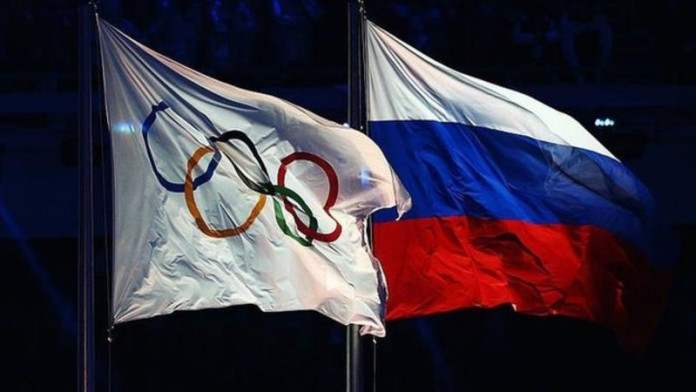Russia will not receive a blanket ban from Rio 2016 following the country’s doping scandal.
The International Olympic Committee (IOC) will leave it up to individual sports’ governing bodies to decide if Russian competitors are clean and should be allowed to take part.
The decision follows a report in which Canadian law professor Richard McLaren said Russia operated a state-sponsored doping programme from 2011 to 2015.
The Rio Games start on 5 August.
Competitors from Russia who want to take part in the Games will have to meet strict criteria laid down by the IOC.
Any Russian who has served a doping ban will not be eligible for next month’s Olympics. Track and field athletes have already been banned.
IOC president Thomas Bach said: “We have set the bar to the limit by establishing a number of very strict criteria which every Russian athlete will have to fulfil if he or she wants to participate in the Olympic Games Rio 2016.
“I think in this way, we have balanced on the one hand, the desire and need for collective responsibility versus the right to individual justice of every individual athlete.”
‘Divisions opened in the Olympic family’
Analysis – Dan Roan, BBC sports editor
“The critics will ask how can it be that a rigorous testing programme can at all be completed in just a few days? The decision by the IOC has been widely condemned. It’s opened up divisions in the Olympic family. Wada, for example, wanted a total ban; athletes’ representatives are at loggerheads with those who run their sports.
“Many will argue, if not now – when the entire anti-doping programme appears to have been subverted by a host nation – then when will a total ban ever be issued? The IOC has come through difficult moments in the past – the Olympic boycotts of the Cold War years, the Ben Johnson doping scandal, the Salt Lake City bidding controversy – but there have never been a few days like these.
“Sadly for the IOC, having been held up as a model of sports governance, that status is now in some jeopardy.”
IOC under fire for decision
The decision not to impose a blanket ban came after a three-hour meeting of the IOC’s executive board, and reaction came quickly.
Russian Sports Minister Vitaly Mutko described the decision as “objective” but “very tough”, while the United States Anti-Doping Agency (Usada) claimed the IOC had “refused to take decisive leadership”.
UK Sports Minister Tracey Crouch said: “The scale of the evidence in the McLaren report arguably pointed to the need for stronger sanctions rather than leaving it to the international federations at this late stage.”
The 28 individual federations now have just 12 days to “carry out an individual analysis of each competitor’s anti-doping record, taking into account only reliable adequate international tests, and the specificities of each sport and its rules, in order to ensure a level playing field”.
The International Tennis Federation quickly confirmed on Sunday that Russia’s seven nominated tennis players meet the IOC requirements, having been subjected to “a rigorous anti-doping testing programme outside Russia”.
Russia’s full Olympic team would consist of 387 competitors.
The International Association of Athletics Federations (IAAF) has already ruled that Russian track and field athletes will not compete at the Games, a decision which was upheld on Thursday by the Court of Arbitration for Sport (Cas).
IAAF president Lord Coe said: “The IAAF team are ready to offer advice to any International Sports Federations given our experience and what we have learned over the last eight months.”
A number of current and former athletes have criticised the IOC decision, with former Olympic swimmer Sharron Davies telling the BBC: “I’m just sad that they’ve passed the buck, as they so often do, down to the governing bodies, and I don’t think the governing bodies have the time to be able to do very much about this.
“I think the only way to send an incredibly strong message to a state-run doping programme is a blanket ban.”
World Anti Doping Agency (Wada) president Sir Craig Reedie said previously that his organisation, which commissioned the McLaren report, wanted the IOC to “decline entries for Rio 2016 of all athletes” submitted by the Russian Olympic and Paralympic committees.
Whistle-blower ruled out of Rio
The IOC also confirmed it will not allow whistleblower Yulia Stepanova to compete as a neutral athlete in Rio.
Stepanova has previously failed a doping test and also did not satisfy the IOC’s “ethical requirements”.
The IOC statement added: “The executive board would like to express its appreciation for Mrs Stepanova’s contribution to the fight against doping and to the integrity of sport.”
Bach said the IOC was “expressing its gratitude” to Stepanova by inviting her and her husband to Rio as guests.
Usada chief Travis Tygart described the decision to exclude Stepanova as “incomprehensible”, adding it will “undoubtedly deter whistleblowers in the future from coming forward”.
How the Russian doping allegations unfolded
December 2014: A German TV documentary alleges that as many as 99% of Russian athletes are guilty of doping. Wada announces an independent commission to investigate the allegations.
9 November 2015: Russia should be banned from athletics completion and were guilty of state-sponsored, systemic doping practices, says Wada’s independent commission.
13 November 2015: IAAF provisionally suspends Russia’s athletics federation from international competition.
27 June 2016: 67 Russian athletes appeal against their bans from this summer’s Rio Olympics to the Court of Arbitration for Sport (Cas).
18 July 2016: Wada’s McLaren report claims Russia operated a state-sponsored doping programme for four years across the “vast majority” of summer and winter Olympic sports.
21 July 2016: Cas rejects the appeal of Russian athletes who attempted to overturn their suspension from this summer’s Olympics.




















